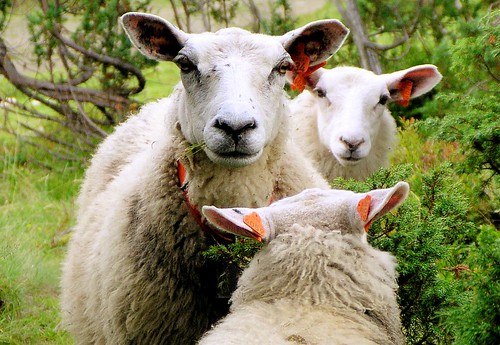 So, you are thinking about raising sheep. Or, maybe it’s goats. It’s probably NOT cattle because just the thought of raising a cow or a beef animal is so daunting – we’re talking a creature that ends up weighing almost as much as a small car.
So, you are thinking about raising sheep. Or, maybe it’s goats. It’s probably NOT cattle because just the thought of raising a cow or a beef animal is so daunting – we’re talking a creature that ends up weighing almost as much as a small car.
If one of those babies steps on your foot, you will NOT be wearing Manolos again. Trust me; I know.
But there are many aspects of raising sheep, goats and cattle that are the same, so … just pick one and learn to care for them really really well and you’ve got the whole class licked. Ruminants – it’s what’s for dinner. There are two areas where, if you learn to get them right, you’ve got 90% of ruminant health licked (in a good way): the digestive system and the hooves. I’ll do this in two parts, the first being the digestive system.
If you want to know why swine, which do have a ‘cloven hoof’ (one of the requirements of animals considered Kosher in Judaism) are NOT Kosher, it’s this: They aren’t ruminants. They are monogastrics. They have a digestive system..just..like..ours. Shorter. Straighter. But the same: mouth – esophagus – single stomach – intestine – out.
But ruminants. Boy, THAT class of mammals has the elegant design solution on digestion. They can live on practically anything made out of cellulose because they are basically (at least in the body cavity) one giant series of different digestive solutions. What can’t be taken care of in one place will get taken care of in another one of the other ‘stomachs’ (in a true ruminant, there are four). If what they’ve got isn’t fully digested, then they have the ability to cough it back up to the beginning (think of it as a digestive infinite “do-loop”), chew it up again, swallow it again, and send it someplace else, with a different set of bacteria and enzymes and it will be dealt with there (oh, yeah..that’s why chewing something over and thinking about it is referred to ‘ruminating’). For more scientific details of how this all works, go here.
That’s the major, defining difference between mammals such as swine and human beings and ruminants. We actually can’t extract a whole lot of stuff out of cellulosic materials. There are certain vegetative things we can get some good out of: fruits and veggies, and what we’re getting out of them are water, vitamins, minerals and from items such as beans, incomplete proteins. But grass? Bark from trees (that’s catnip to goats, which is why the Middle East is as dry as it is – all that goat grazing killed off most of the trees)? Nuthin. And as a matter of fact, when human beings have been forced to eat that sort of material due to famines, they die.
But ruminants? With the very elegant features and occupants of their digestive systems, they can eat grass (or leaves, or bark or young ends of branches of trees), and transform it into everything they need: protein, carbs, vitamins, the lot.
And what this means, more than anything else, is that while as a group they need a good pasture of mixed plants, grasses, wildflowers, etc., ruminants do not need fancy feeds. As a matter of fact, the simpler the food, the better. It also means that there are things that ruminants do…not…need and frankly are not good for them, the major item being sugars in the feeds, such as beet pulp or molasses. When feed mixers put that sort of thing in ruminant feeds, it is more to placate the owners. The animals don’t need it and frankly, it puts the bacteria et al. in the systems on their own little versions of steroids. They go crazy, generate a huge amount of gas, which causes a lot of pain for the animals. That’s called bloat.
Another item in feeds (or in pastures for that matter) that ruminants do not need is a lot of protein. Even in the depth of winter..even while pregnant, ruminants do not need to be fed things like soy protein. Hay with a lot of alfalfa in it can give them a lot of stress as well. Remember: The bacteria in the gut of ruminants makes protein. The animals themselves don’t need to be fed protein.
Another item to watch for in feeds (or in salt mixes or salt blocks) is copper. This accumulates in the liver for sheep and will kill them. So, if you live in a hard water area and have copper pipes running up to your barn – do not be surprised if you have issues with your sheep and your vet tells you that they have copper poisoning.
So, back to the digestive system. In a ruminant looks like this:
Very different from us.
One of the other aspects to this is that there are a lot of things that can totally unbalance the system and make the animal very very sick. As mentioned before, too much protein or sugar in the feed or pasturage can cause bloat. If the animal gets a bacterial infection, this can cause all sorts of havoc. Once, years ago, we had two rams, one of which got an infection that totally wiped out his ‘normal flora’. The only reason we found out of about it was that we came into the barn one morning and found the other ram holding him up against the wall like an old drunk. He’d gone completely blind and had no sense of taste or smell. We could not tempt him with any food of any sort. We could put it into his mouth and he’d just push it out with his tongue. The problem: since it’s the bacteria in the gut that synthesize the B vitamins for the sheep, any bacterial infection that kills off the ones you want, destroys the ability of the animal to make its own B Vitamins – and that is what caused the blindness and lack of smell and taste. We had to give him huge amounts of antibiotics and B-vitamin shots for days and then repopulate his gut with horse syringes full of unflavored yoghurt (our other option would have been to pass a stomach tube to one of the other sheep and then transfer some of that animal’s gut contents into the stomach of the sick ram. But I digress: the therapy worked). So, remember – a healthy digestive system is your best weapon in keeping your sheep happy and healthy as well.
Next episode: Hooves: no, we are not talking mani-pedi’s here.
(ruminant digestive system courtesy of: Colorado State Sheep photo courtesy of gari.baldi)
